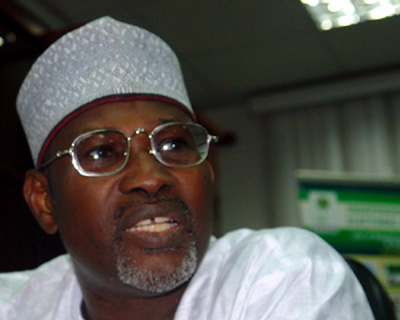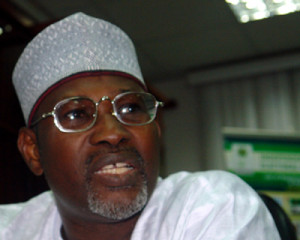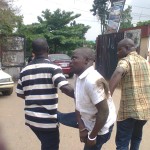Still On Poll Shift, ByAdewale Kupoluyi
Articles/Opinion, Latest Headlines Saturday, February 14th, 2015
While announcing the postponement of the general elections by six weeks, the Chairman of the Independent Electoral Commission (INEC), Professor Attahiru Jega, averred that it would be unconscionable for INEC to deploy personnel and call voters out when security could not be guaranteed especially in Borno, Yobe, Adamawa and Gombe states, based on the suggestion given by the National Security Adviser to the President, Col. Sambo Dasuki (retd) and the service chiefs that they needed enough time to conclude a major military operation against insurgency in the North-East. Apart from the four affected states, INEC said it was also worried about the security of its regular staff, adhoc staff, voters, election observers as well as sensitive election materials. The NSA, in faraway London, had earlier called for postponement on the ground that over 30 million Permanent Voter Cards (PVCs) had yet to be distributed, suggesting that INEC was ill-prepared for the elections.
The postponement has been received with mixed feelings by political parties, groups and personalities within and outside the country. While the Federal Government, the ruling Peoples Democratic Party (PDP), some individuals and interest groups have applauded the move, the opposition All Progressives Congress (APC) and not a few political organisations and associations have, on the other hand, condemned the decision. Apart from the pending court cases instituted against holding the elections and in what looks like acting-out-a-script, prominent Nigerians like Dr. Alex Ekwueme, Chief Edwin Clark, Dr. Femi Okurounmu and Dr. Chukwuemeka Ezeife, under the umbrella of the Southern Nigeria Peoples Assembly, even called for the arrest of Jega. For these reasons, many people feel that postponement could deliberately have been imposed on INEC, to give the ruling party enough time to restrategize and perhaps, do a damage control at the detriment of the opposition party.
The shifting continues to have implications for our polity. First, it has lent credence to the widely-held opinion that INEC does not have true autonomy and independence, meaning that the commission will continue to be at the mercy of the government and when this subsists, the sanctity of the electoral process becomes questionable since the ruling party itself is involved in the race. Secondly, it portrays the nation in bad light. The postponement simply gives the impression that we cannot get things rightly. We recall that a few weeks back, the United States’ Secretary of State, John Kerry, during his visit had warned against postponements because of its dire consequences. As it is now, many international observers and civil society groups have been forced to go back to their countries only to return at another date, having wasted precious time and resources. Thirdly, it has generated unnecessary tension in the land. Apart from hot exchange of words by the various camps in the past few days, there was reported incidences of laying of siege by soldiers to the residence of the APC leader, Asiwaju Bola Tinubu, alleged bugging of telephone lines of top opposition leaders as well the speculated crack-down on the media in the coming weeks. Fourthly, all eyes would be on our security agencies to see how they would tame the Boko Haram insurgency as failure to achieve this feat would amount to loss of confidence in our armed forces. Fifthly, the postponement has led to economic downtown, capital flight and the depreciation of the naira against other international currencies as investors are panicky over whether the elections would eventually hold or not. Again, the postponement would cost political parties huge and additional campaign expenses, which probably was unbudgeted for. Lastly and more importantly, more Nigerians would now be availed of the opportunity to collect their PVCs and fulfill their civic obligation by voting for candidates of their choice.
For now, nobody knows what could happen in the next few weeks. We only pray for the best for our dear country bearing in mind that the credibility of the electoral process is critical to the sustenance of political and social stability as well as economic progress. Therefore, INEC should continue to mobilise the people to collect their cards without losing the steam, as six weeks would just come and go without even knowing it. More importantly, INEC should ensuring efficiency of its officials and by maintains neutrality as much as possible, such that the elections will be free, fair, credible and transparently accepted. And for the security agencies, Nigerian are awaiting for the greatest surprise of how they will curtail the violence in the north, which has dangerously claimed many innocent lives and destroyed property in the last five years. The government should avoid dragging the armed forces into partisan politics. As it is now, the questions to ask are: can our ill-equipped, poorly motivated military forces curtail Boko Haram in just six weeks? What if the security apparatus still fail to provide adequate security in the affected states, where the insurgents were said to have captured over 120 villages and towns? If eventually, they succeed in achieving this, then the next question will be, why wait till now? And if they fail to make the desired impact even with the ongoing military onslaught, will elections be postponed again?
It is instructive to note that despite the turmoil in countries like Afghanistan, Iraq and Syria that have been ravaged by severe civil wars, they still held elections in their territories. That is why it remain very difficult to sell the idea that elections should be suspended in the entire federation comprising 36 states, a Federal Capital Territory and 774 local councils, in line with the recommendations of National Council of State, the United States of America, Britain and other reputable local groups. No doubt, the presidential contest seems to be one of the most keenly contested in the country’s electoral history because a ruling party is confronting a formidable opposition force in an almost unprecedented manner. This apprehension by the people might have accounted for why the Federal Government has given the re-assurance that May 29 hand-over date remains sacrosanct and in line with the provisions of the 1999 Nigerian Constitution (as amended), the United Nations International Covenant on Civil and Political Rights and the International Covenant on Economic, Social and Cultural Rights. The people have the right of self-determination and choosing who rule them.
While we look forward to the new dates, political parties should continue to ensure that their members remain calm, optimistic, law abiding while all forms of violence should be avoided. The government should ensure the kidnapped Chibok girls are freed, Internally Displaced Persons (IDPs) are not disenfranchised, freedom of the media should be guaranteed while losers at the elections should show sportsmanship by accepting defeat. Nigerians, who are yet to collect their PVCs should do so without delay and avoid last-minute rush. The ruling party should also stop giving an impression that it is desperate to rule at all cost. Afterall, nothing meaningful can be achieved under a tensed atmosphere where crisis, acrimony, violence and lawlessness prevail.
Kupoluyi writes from Federal University of Agriculture, Abeokuta (FUNAAB), adewalekupoluyi@yahoo.co.uk, @AdewaleKupoluyi, www.adewalekupoluyi.blogspot.com
Related Posts
Short URL: https://www.africanexaminer.com/?p=22240























